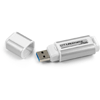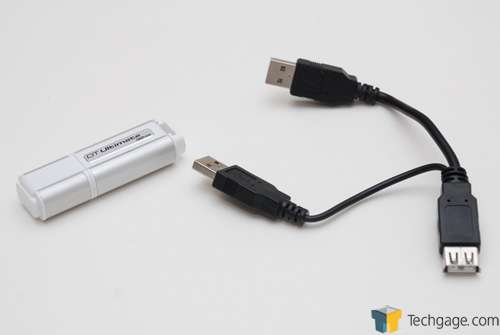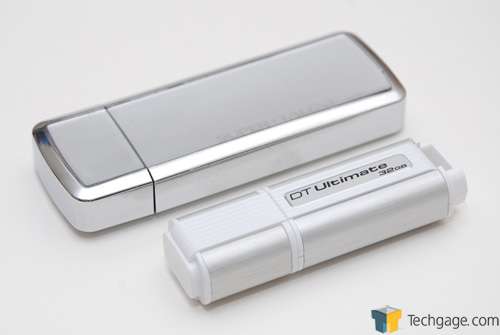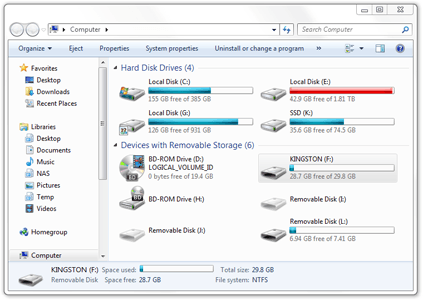- Qualcomm Launches Snapdragon 4 Gen 2 Mobile Platform
- AMD Launches Ryzen PRO 7000 Series Mobile & Desktop Platform
- Intel Launches Sleek Single-Slot Arc Pro A60 Workstation Graphics Card
- NVIDIA Announces Latest Ada Lovelace Additions: GeForce RTX 4060 Ti & RTX 4060
- Maxon Redshift With AMD Radeon GPU Rendering Support Now Available
Kingston DataTraveler Ultimate 3.0 32GB

If you’re in the market for a flash drive and your PC supports USB 3.0, seeking out a compatible product is a no-brainer. The speed potential is huge, and most often, the cost premium is not. In the case of Kingston’s DataTraveler Ultimate 3.0, it’s 2.5x faster than the fastest USB 2.0 drive, and features far better IOPS performance.
Page 1 – Introduction
About a year ago, motherboards began trickling out to the market that featured support for the USB 3.0 protocol, and afterward, it took a good six months before consumers had any sort of real choice of products that could take advantage of it. It’s primarily been storage devices that companies are pushing, and for good reason. Can you think of another USB peripheral that could benefit from such huge bandwidth? HD Webcams, perhaps, but we’ve yet to see any of those.
The first proper USB 3.0 device we took a look at was Super Talent’s SuperCrypt flash drive this past summer, and overall, it showed us just what these new-fangled USB ports are capable of. That drive was more of an SSD model though, as it featured high-quality NAND chips capable of pushing a huge number of IOPS. The downside? Pricing, of course.
Months later, we took OCZ’s Enyo for a spin, and once again, the performance was quite spectacular. It became clear that for those who want ultimate speed in their portable devices, real options were coming to market. Like regular SSDs though, the pricing of these portable drives are much higher than a typical thumb drive, so what if a company pushed out a thumb drive that used modest memory chips but still supported USB 3.0?
That’s Kingston’s idea behind the DataTraveler Ultimate 3.0, and at $100 USD for the 32GB model, the price seems to be right. The drive promises read speeds of 80MB/s and write speeds of 60MB/s, so it certainly holds the potential to live up to its “ultimate” name.
Closer Look
Kingston’s DataTraveler Ultimate 3.0 comes in a rather simple blister pack, and as is typical of most blister packs, it’s a true pain to open. I came close to cutting myself, but prevailed unscathed. Inside of the package is a dual-headed USB cable that you can use to plug the drive into two different 2.0 ports at the same time in case there isn’t enough power being delivered (this isn’t a problem I experienced).
The drive itself is larger than most 2.0 drives, but it’s still quite manageable, and compared to the SuperTalent SuperCrypt as seen in the photo below, it’s far smaller – despite having the same density.
The DT Ultimate 3.0 is a drive that features no real frills aside from its performance. It doesn’t include security software to encrypt data or anything of the sort, but for most people that isn’t going to matter. For me, it’s a benefit, since security partitions tend to bork the drive for Linux use. Instead, this drive should work in any computer you plug it in, thanks to the fact that it’s 2.0 backwards compatible.
Let’s dive right into our test methodology and also our results.
Support our efforts! With ad revenue at an all-time low for written websites, we're relying more than ever on reader support to help us continue putting so much effort into this type of content. You can support us by becoming a Patron, or by using our Amazon shopping affiliate links listed through our articles. Thanks for your support!








